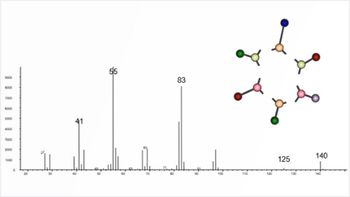
In situ COF-SPME Probe Coupled to ESI-MS to Detect Tricyclic Antidepressants in Biosamples
A new method for monitoring tricyclic antidepressants (TCA) in biological fluids and tissues in real time was proposed for the purposes of improving their effects or determining causes of death.
Researchers at Fuzhou University in Fuzhou, China have created a novel covalent organic framework (COF)-based solid-phase microextraction (SPME) probe and combined it with electrospray ionization mass spectrometry (ESI-MS) for the determination of tricyclic antidepressants (TCA) in varied biosamples (1).
Their study, published in the Journal of Chromatography A, details the fabrication of the probe by an in situ, step-by-step strategy that sequentially modified 1,3,5-tri(4-aminophenyl) benzene (TPB) and 2,5-divinylbenzaldehyde (DVA) on the surface of a polydopamine layer on stainless steel needles. The TPB-DVA-COF-SPME probe proved reusable for biosamples including the brain, kidney, liver, and serum, and ESI-MS analysis was judged to be both sensitive and rapid.
A COF-based SPME probe for ESI-MS refers to a specialized device used in analytical chemistry for sample extraction and analysis. The COF, a porous and stable material composed of covalently linked organic units, serves as the solid-phase coating in the SPME probe. This coating selectively extracts target analytes from a sample matrix, enhancing their concentration and facilitating their subsequent ionization during ESI-MS analysis. The COF-based SPME probe offers improved sensitivity, selectivity, and reproducibility in the analysis of various compounds.
TCAs are a class of drugs meant to be first-line treatments for depression or chronic neuropathy, and include amitriptyline, doxepin, and nortriptyline. They are in common use and are effective, but as medication-induced suicide by poisoning has increased in recent decades, there exists a need for TCAs to be accurately monitored in biological fluids and tissues. The researchers list two main reasons for this: The therapeutic window to avoid side effects is narrow in TCAs, and the rapid absorption and accumulation of TCAs in tissues need to be analyzed to determine causes of death such as poisoning or overdose.
Either liquid or gas chromatography coupled to mass spectrometry (LC–MS or GC–MS, respectively) have become the authoritative methods in the determination of some drugs, but associated sample preparation techniques such as liquid-liquid extraction (LLE) or solid-phase extraction (SPE) have a history of taking excess time, labor, samples, and organic solvents, according to this study. To speed up analyte enrichment and increase sensitivity, solid-phase microextraction (SPME) combined with ambient electrospray ionization mass spectrometry (ESI-MS) has received increased attention as a viable alternative.
However, given drawbacks of commercial SPME coatings which may include fragility, thermal instability, non-selectivity, or low adsorption capacity, all which affect the overall sensitivity of SPME–ESI-MS, a coating based on covalent organic framework (COF) nanomaterial was developed for this study. The in situ growth method was employed rather than the more commonly used approaches of sol-gel or physical gluing. TPB and DVA were chosen as the monomers and modified on a stainless steel needle at room temperature.
The TPB-DVA-COF-SPME probe was found to exhibit high specific surface area (1244 m2·g−1), regular pores (3.23 nm), and hydrophobicity and stability sufficient for the efficient enrichment of the three TCAs selected as target analytes. Subsequent analysis by ambient ESI-MS yielded low limits of detection (0.1–0.5 μg∙L−1), high enrichment factors (39–218), and low relative standard deviations for both one probe (1.2–3.8%) and probe-to-probe (2.0–3.7%).
Because of this reliable performance, the TPB-DVA-COF-SPME probe was successfully applied to biosamples with what the researchers said was excellent reusability, they concluded that COF-SPME–ESI-MS could be further developed for ultra-trace analyses of TCAs both forensically and clinically.
Reference
(1) Yuan, J.; Huang, W.; Tong, W.; et al. In-situ growth of covalent organic framework on stainless steel needles as solid-phase microextraction probe coupled with electrospray ionization mass spectrometry for rapid and sensitive determination of tricyclic antidepressants in biosamples. J. Chromatogr. A 2023, 1695, 463955. DOI:
Newsletter
Join the global community of analytical scientists who trust LCGC for insights on the latest techniques, trends, and expert solutions in chromatography.




